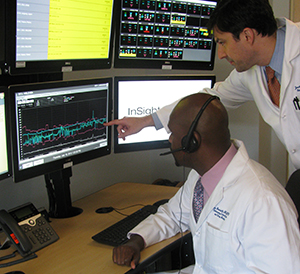
In the InSight Tele-ICU Clinical Center at the York Street Campus, Peter Marshall, MD, (left) InSight medical director, and Jonathan Siner, MD, Medical Intensive Care Unit medical director, monitor patients in intensive care units at both YNHH campuses and at Greenwich Hospital.
In the eight years since its launch, Yale New Haven Hospital's TeleStroke Program has helped improve outcomes for thousands of patients.
Within the first few months of opening, Yale New Haven Health System's InSight Tele-ICU helped save the life of a patient whose blood pressure had suddenly dropped.
Telehealth programs such as these allow physicians to use video conferencing, image-sharing technology, electronic medical records and other tools to remotely help monitor, examine and diagnose patients and recommend treatment.
YNHHS and Yale Medical Group (YMG) are partnering to implement additional telehealth programs, which have grown nationwide in recent years because they expand patients' access to primary and specialty care, regardless of where those patients are located. For example, YNHH physicians use TeleStroke to assess about a dozen patients a month at hospitals throughout Connecticut.
In addition to receiving an e-visit or e-consult from a physician while in the hospital, patients can connect with physicians and other clinicians while at home or on the go, via their computers, mobile phones, tablets and other devices. This flexibility helps enhance care quality and patient satisfaction, by reducing unnecessary office visits and wait times and improving physician-patient communications.
"Telehealth programs can be particularly beneficial for patients with chronic conditions such as diabetes or cardiovascular disease, who require ongoing care, education and assistance," said Joseph Bisson, vice president, Business Development, YNHHS. "By making it easier and more convenient for patients to access the care they need, telehealth programs can help prevent complications from a patient's illness and ultimately reduce care costs, for patients and healthcare providers."
In addition to TeleStroke and the InSight Tele-ICU, current YNHHS telehealth programs include:
- MDLIVE: Part of the medical benefit plan for YNHHS benefits-covered employees and their covered dependents, MDLIVE provides 24/7/365 access to board-certified physicians by secure phone, video or email for non-emergent conditions
- E-visits via FaceTime between behavioral health providers and patients in YNHH's emergency departments
Representatives from YNHHS and YMG have formed a steering committee to coordinate and centralize implementation of future telehealth pilot programs. These will include e-visits for patients in additional clinical areas, "remote second opinions" provided by YNHHS and YMG physicians and e-consults from primary care to specialty care providers.
